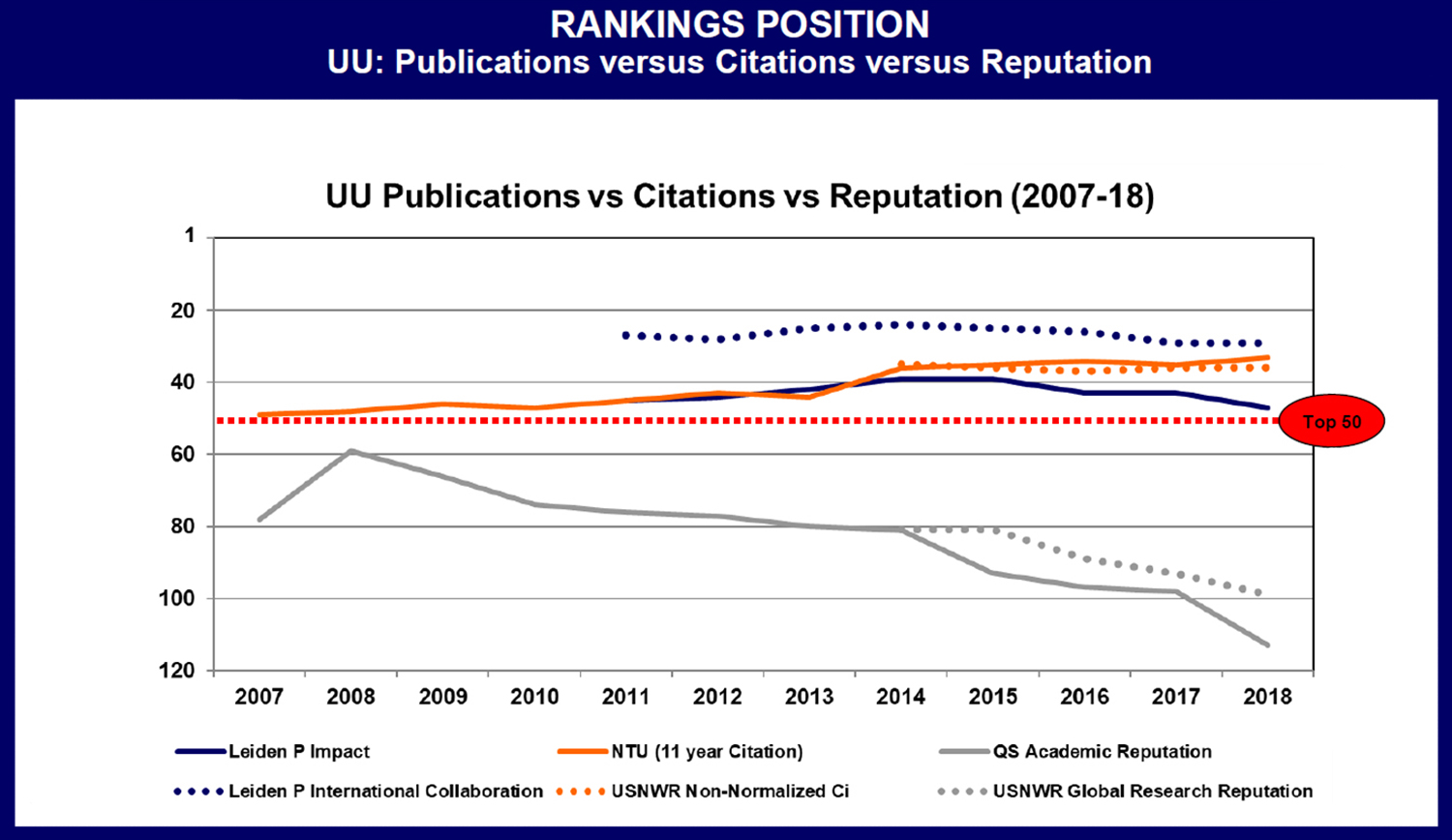‘Utrecht University should promote itself better to prevent damage to reputation’

“If nothing changes, I expect Utrecht University to fall down a lot in several international rankings in the coming years.” It’s a tough message delivered by marketing researcher Daniel Guhr, associated with the Illuminate Consulting Group, an international organisation that advises universities throughout the world.
At the moment, the UU is performing rather well in international rankings. In Europe, the UU is in the top-50; at a global level, the UU is among the 100 best universities. Guhr concludes the UU does well if you’re looking at citations and publications. But if you look at the QS ranking, which mostly focuses on reputation – for instance based on how well-known a university is – the UU ranks significantly lower. “In these rankings, reputation is important, and Utrecht doesn’t score very high in that aspect. Other universities, for instance in China and India, do pay a lot of attention to this. This makes them climb through the rankings, and it’ll be at the expense of Utrecht.”
Guhr says this might have dramatic consequences for the UU. “You see more and more international organisations, such as the European Union, include reputation in their assessment of research applications. If you drop in the rankings, you’ll look less attractive to peers, and will have a harder time obtaining research funds.”
The main cause, Guhr says, is that the UU is bad at ‘selling itself’ abroad. “Try to summarise in a single sentence what the UU stands for. For most people, that’s an impossible task.”
Own faculty
For his reputation study, he conducted interviews with UU employees. “Within the university, few scientists have a feel for how to put Utrecht University as a whole on the map. Many criticise the study as well, because they don’t see the UU as a ‘brand’. The scientists see themselves more as representatives of their own faculty or research group.” He noticed among scientists that half of them have an aversion against the concept of ‘UU branding’ and the other half don’t identify themselves as being part of the ‘UU brand’.
Remarkably, Dutch scientists identify the UU as a European top university, while UUers abroad see the UU more as a top university of the Netherlands. It’s the foreign scientists who say the UU isn’t manifesting itself enough internationally.
This is reaffirmed in the study by foreign partners suggested by the UU. Employees of these partners barely know the UU. Those in Europe may know of the university, but can’t say what it stands for. Outside of Europe, the UU’s profile is a lot more unknown. Guhr was told that the UU is seen as a Calvinist organisation, well-organised - professionally speaking – but mostly directed inwards. They know the scientists they collaborate with, and often have no clue what other things happen at the UU. No one places UU at the top of Europe. “The most remarkable was a comment from an Australian director of a scientific institute, who asked whether the UU also did research in medicine. He only knew researchers from the UMCU, you see.”
Brand architecture
The Executive Board sent a memo to the University Council last week, with the goal of establishing ‘a brand DNA and brand architecture’. “A strong reputation calls for a strong brand,” the memo says. The brand DNA is the sum of vision, mission, core values, promise, and profile that the UU wants to project, and should form the basis in its communication. Brand architecture includes concepts like how the separate UU departments relate to the UU as a whole.
Working on the latter, the UU Executive Board has decided UU institutions may not use their own logos. The word ‘Utrecht’ is also not allowed to be part of an institute’s name. Organisations like ‘Utrecht Centre of Entrepreneurship’ or ‘Utrecht Centre of Medieval Studies’ would have to change their names. The idea is that the UU logo is the basis, and it should always be possible to add the name to Utrecht University.
Force doesn’t work
The question is whether that will work. Daniel Guhr says force will not lead to a cultural shift. He calls for increased awareness among scientists, to let them promote themselves more as UU researchers. It still happens often, for instance, that scientists are present on TV news broadcasts or talk shows, without a single mention of them working for the UU. The international network also needs to be strengthened. “Go to the presentation of the Times Higher Education list, show your face more often,” says Guhr. The university should attract even more talents from abroad, and entice more international students to do their Master’s programme in Utrecht. Finally, the UU should consider the question of ‘what do we actually stand for?’ And the answer to that should be the message that’s presented everywhere.
Responses from professors
DUB asked a number of professors to respond to Daniel Guhr’s findings.
Hans Clevers, Distinguished Professor of Molecular Genetics, attached to the Hubrecht Institute, and scientific director of the Princess Máxima Centre. “I recognise the problem about the university’s visibility abroad. Looking at Medicine, I think merging the Medicine faculties with Academic hospitals (and thus creating the UMCs) was a great disadvantage to the international visibility of our universities. At Humanities and Social Sciences, the focus is more on education and the Netherlands. And we don’t have an international business school like in Rotterdam either. To realise the reputation of the university, it’d be better to present individuals who really make a difference internationally. It’s more about the people than about the programmes, the curricula, or strategies. Think about things like the assistant professor programme, in which these professors take on ambassador roles, but with substantial financial support. If we could present the entire biomedical sector (including UMCU and Veterinary Medicine) in a coherent way, we might even be the biggest biomedical campus in all of Europe.
“I recognise the problem about the university’s visibility abroad. Looking at Medicine, I think merging the Medicine faculties with Academic hospitals (and thus creating the UMCs) was a great disadvantage to the international visibility of our universities. At Humanities and Social Sciences, the focus is more on education and the Netherlands. And we don’t have an international business school like in Rotterdam either. To realise the reputation of the university, it’d be better to present individuals who really make a difference internationally. It’s more about the people than about the programmes, the curricula, or strategies. Think about things like the assistant professor programme, in which these professors take on ambassador roles, but with substantial financial support. If we could present the entire biomedical sector (including UMCU and Veterinary Medicine) in a coherent way, we might even be the biggest biomedical campus in all of Europe.
Linda Senden, professor of European Law: “My experience is that scientists both state which faculty or research group they work with, as well as clearly state they’re affiliated with Utrecht University. Our department coordinates the European Equal Treatment network within the European Commission. The link to the UU is very clear. The same thing holds true for the collaboration with University College Dublin, with whom we have a shared Master’s programme. It’s also important to present the image of the UU as a whole. It’s good for attracting talented students and employees. I also feel that our international partners sufficiently value the UU.I think for scientists, it’s important to know that when you’re abroad you’re sort of a figurehead for the UU. In my opinion, the international communication could be improved, to highlight UU research and increase the international name of our university.”
“My experience is that scientists both state which faculty or research group they work with, as well as clearly state they’re affiliated with Utrecht University. Our department coordinates the European Equal Treatment network within the European Commission. The link to the UU is very clear. The same thing holds true for the collaboration with University College Dublin, with whom we have a shared Master’s programme. It’s also important to present the image of the UU as a whole. It’s good for attracting talented students and employees. I also feel that our international partners sufficiently value the UU.I think for scientists, it’s important to know that when you’re abroad you’re sort of a figurehead for the UU. In my opinion, the international communication could be improved, to highlight UU research and increase the international name of our university.”
Bert Weckhuysen, professor of Inorganic Chemistry and Katalysis, and Distinguished Professor since 2018: “When a scientist presents themselves abroad, they’ll always do so as professor at Utrecht University. I do the same. The UU logo is visible in each and every presentation. If you’re being fair, the UU is a fairly good mid-level performer, worldwide. And it’s fine to position yourself like that. We’re not Stanford, spending a lot of time and money on continuous campaigns. I was in China last week, and you’re completely immersed in hospitality. There’s so much attention for that. As Utrecht University, you have to present an authentic story. Utrecht University is an old rooted university, with a long tradition, located in a beautiful city. We’re a broad university, with high-quality research and education in a number of disciplines. It’s human work, so it’s a good thing to use UU researchers for this who excel in their disciplines.”
“When a scientist presents themselves abroad, they’ll always do so as professor at Utrecht University. I do the same. The UU logo is visible in each and every presentation. If you’re being fair, the UU is a fairly good mid-level performer, worldwide. And it’s fine to position yourself like that. We’re not Stanford, spending a lot of time and money on continuous campaigns. I was in China last week, and you’re completely immersed in hospitality. There’s so much attention for that. As Utrecht University, you have to present an authentic story. Utrecht University is an old rooted university, with a long tradition, located in a beautiful city. We’re a broad university, with high-quality research and education in a number of disciplines. It’s human work, so it’s a good thing to use UU researchers for this who excel in their disciplines.”
Brigitte Unger, professor of Economics of the public sector: “Whenever I’m abroad, I always say I’m from Utrecht University, and refer to the UU’s ranking on international and national rankings. I do notice that the university’s international name isn’t very well-known. There’s definitely room for improvement there. In my discipline especially, economics, people abroad know Tilburg University more than they know Utrecht. I also notice not all experiences with the UU are positive ones. Things like having to wait two months to get a reply to an email. One partner was sent from department to department and they told me that even when higher-ups demanded payment, it still took weeks. That’s very unpleasant – and this, while the UU has a lot more support staff than other universities. The UU is a bloated organisation with one supporting employee for each scientist. “Do you even spend time on research at your university,” they asked at Copenhagen Business School. The difference is remarkable. Copenhagen Business School has 2,217 employees, and only 700 of them are supporting staff.”
“Whenever I’m abroad, I always say I’m from Utrecht University, and refer to the UU’s ranking on international and national rankings. I do notice that the university’s international name isn’t very well-known. There’s definitely room for improvement there. In my discipline especially, economics, people abroad know Tilburg University more than they know Utrecht. I also notice not all experiences with the UU are positive ones. Things like having to wait two months to get a reply to an email. One partner was sent from department to department and they told me that even when higher-ups demanded payment, it still took weeks. That’s very unpleasant – and this, while the UU has a lot more support staff than other universities. The UU is a bloated organisation with one supporting employee for each scientist. “Do you even spend time on research at your university,” they asked at Copenhagen Business School. The difference is remarkable. Copenhagen Business School has 2,217 employees, and only 700 of them are supporting staff.”